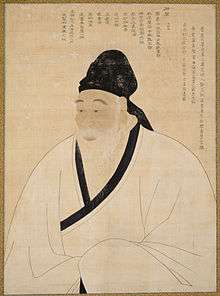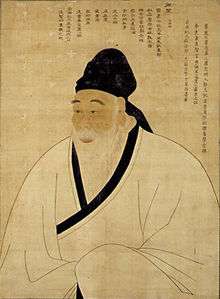Song Si-yeol
|
Song Si-yeol |
|
|
| Korean name |
|---|
| Hangul |
송시열 |
|---|
| Hanja |
宋時烈 |
|---|
| Revised Romanization |
Song Si-yeol |
|---|
| McCune–Reischauer |
Song Si-yŏl |
|---|
| Pen name |
|---|
| Hangul |
우암, 우재, 교산노부, 남간노수, 화양동주 |
|---|
| Hanja |
尤庵, 尤齋, 橋山老夫, 南澗老叟, 華陽洞主 |
|---|
| Revised Romanization |
U-am, U-jae, Kyosannobu, Namganrosoo, Hwayangdongjoo |
|---|
| McCune–Reischauer |
U-am, U-jae, Kyosannobu, Namgannosu, Hwayangdongju |
|---|
| Courtesy name |
|---|
| Hangul |
영보, 성뢰, 성래 |
|---|
| Hanja |
英甫, 聖來, 聖賚 |
|---|
| Revised Romanization |
Yeongbo, Sungrae, Sungrwoi |
|---|
| McCune–Reischauer |
Yeongbo, Soengrae, Seongrwoi |
|---|
| Posthumous name |
|---|
| Hangul |
문정 |
|---|
| Hanja |
文正 |
|---|
| Revised Romanization |
Munjeong |
|---|
| McCune–Reischauer |
Munjŏng |
|---|
Song Si-yeol (Korean: 송시열, Hanja: 宋時烈, 30 December 1607 - 19 July 1689), also known by his pennames U-am (우암) and U-jae (우재) or by the honorific Songja (Korean: 송자, Hanja: 宋子), was a Joseon statesman and a Neo-Confucian scholar and philosopher. Born in Okcheon, North Chungcheong, he was known for his concern with the problems of the common people. He served in governmental service for more than fifty years, and his name features over 3,000 times in the Annals of Joseon Dynasty, the greatest frequency that any individual is mentioned. He was executed by the royal court for writing an inflammatory letter to the king.
There is a monument to him in his hometown.
He is also known as the calligrapher who inscribed an epitaph (Chungyeolmyobi Takboncheop) in dedication of Admiral Yi Sun-sin, which is preserved at the Chungyeolsa Shrine (historical site No. 236).
Works
- Uamjip (우암집, 尤庵集)
- UamSeonsanghoojip (우암선생후집, 尤菴先生後集)
- Uamyugo (우암유고, 尤菴遺稿)
- Joojadaejeon (주자대전잡억)
- Songseoseupyu (송서습유, 宋書拾遺)
- Songseosokseupyu (송서속습유, 宋書續拾遺)
- Joojadaejeonchaui (주자대전차의, 朱子大全箚疑)
- Jeongseobunryu (정서분류, 程書分類)
- Joojauhryusobun (주자어류소분, 朱子語類小分)
- Nonmaengmunuitonggo (논맹문의통고, 論孟問義通攷)
- Shimgyungseokui (심경석의, 心經釋義)
- Shambangchwalyo (삼방촬요, 三方撮要)
- Songjadaejeon (송자대전, 宋子大全)
- Jangreungjimun (장릉지문, 長陵誌文)
- Youngreungjimun (영릉지문, 寧陵誌文)
- Songjungilmyojimyung (송준길묘지명)
- Sagyeseonsaenghangjang (사계선생행장, 沙溪先生行狀)
Gallery
See also
 |
Wikisource has original text related to this article:
|
External links
The Four Factions of the Joseon Dynasty |
|---|
| | Lesser Northerners |
- Yu Yeong-gyeong
- Yu Hui-bun
- Park Seung-jong
- Yu Mong-in
- Nam Yi-gong
- Nam Yi-ung
- Gi Ja-heon
- Clear Northerners
- Murky Northerners
- Pyemo Incident
- Injo Banjeong
|
|---|
| | Southerners | |
|---|
| | Soron | |
|---|
| | Noron |
- Song Si-yeol
- Kim Su-hang
- Min Jin-won
- Gwon Sang-ha
- Kim Seok-ju
- Queen Inhyeon
- Jeong Ho
- Kim Chang-jib
- Yi Yi-myeong
- King Yeongjo
- Hong Bong-han
- Hong In-han
- Jeong Hu-gyeom
- Kim Gwi-ju
- Kim Jong-su
- Sim Hwan-ji
- Yun Ji-dong
- Kim Gwan-ju
- Kim Jo-sun
- Tangpyeong
- Execution of Prince Sado
- Noron Byeokpa
- Noron Sipa
- Queen Jeongsun
- Palja Hyungeon
- Sedo Politics
|
|---|
| |
|










